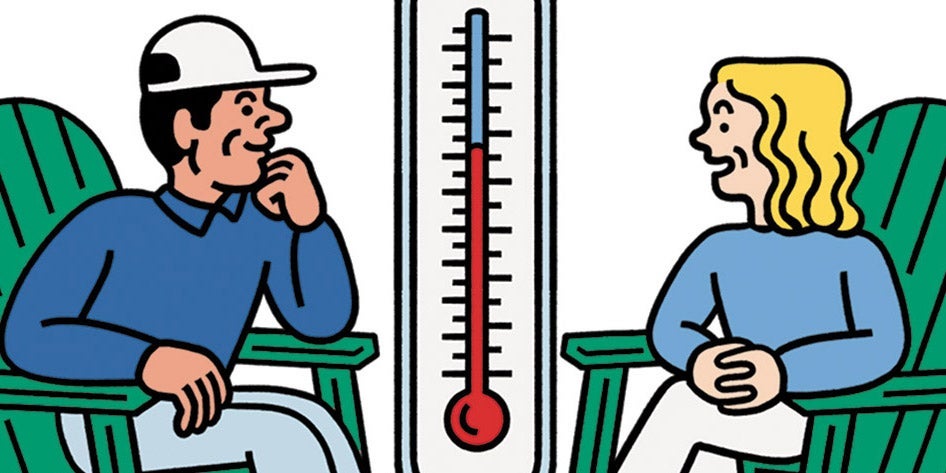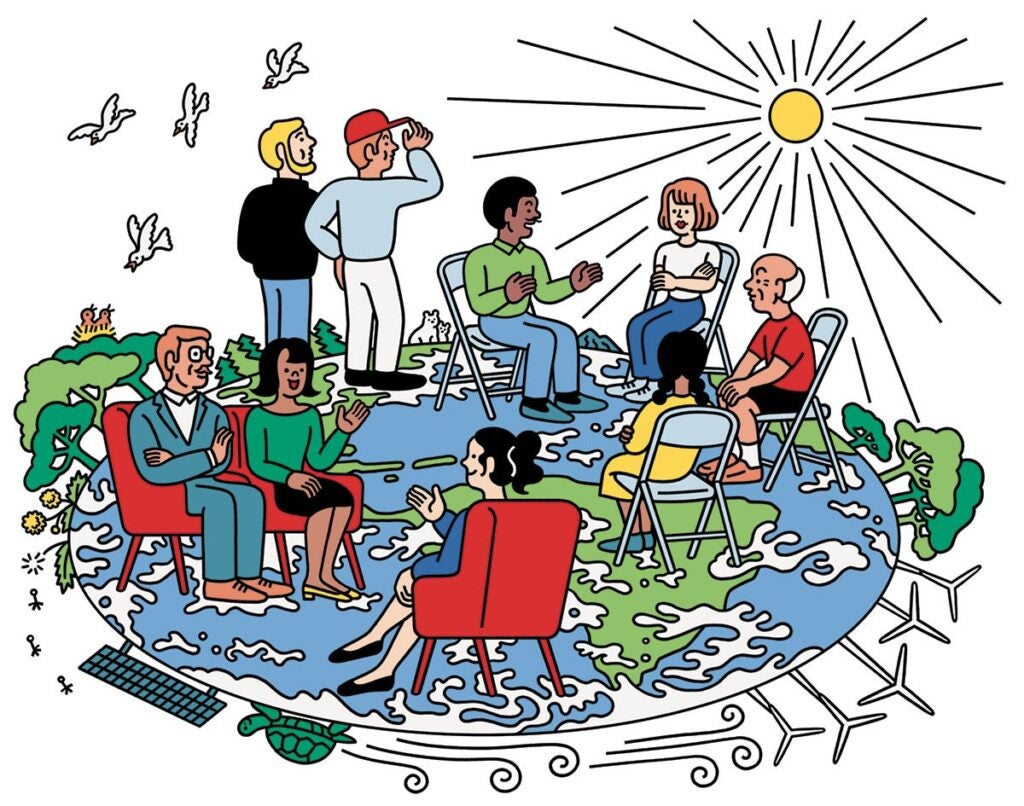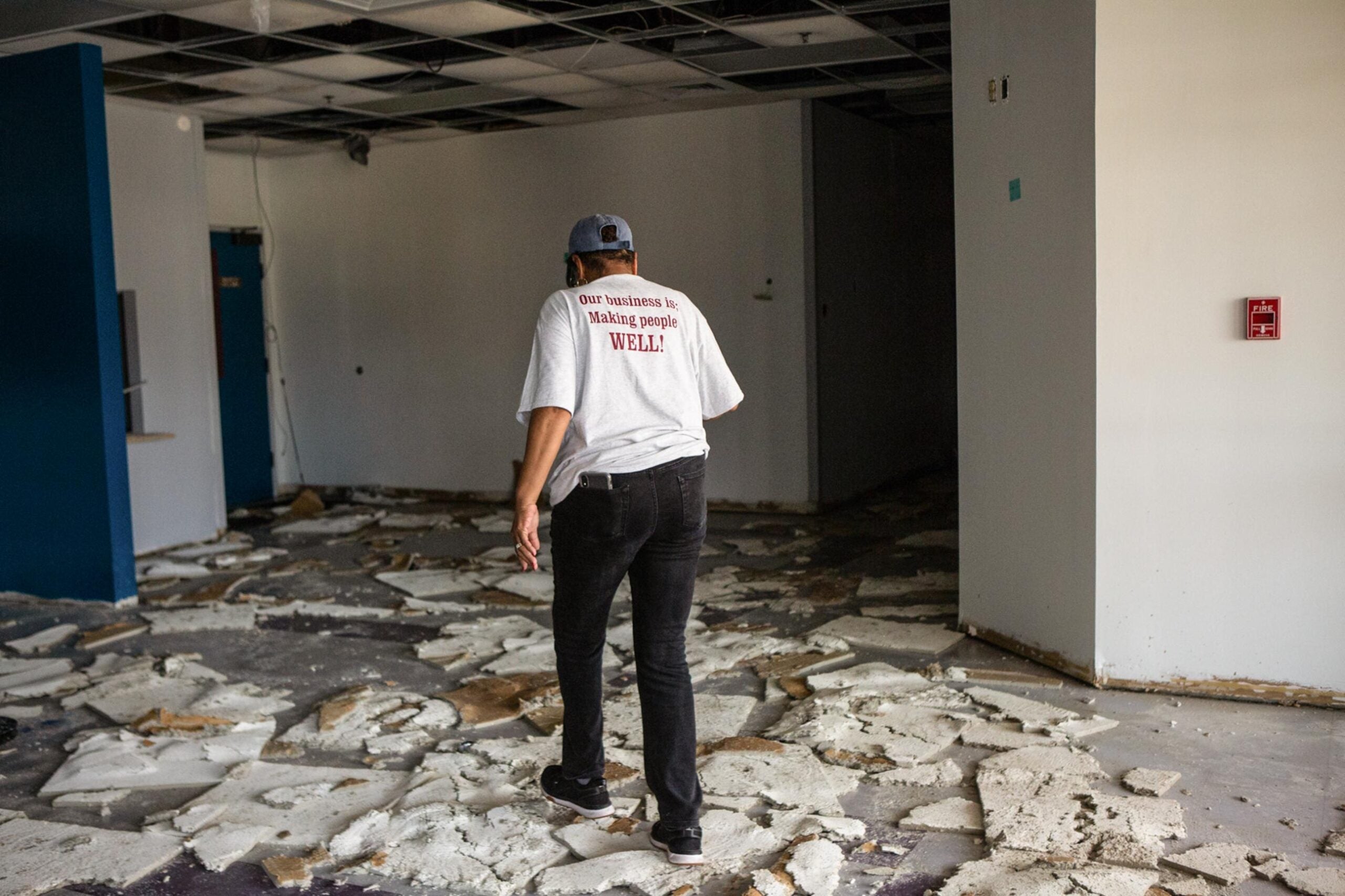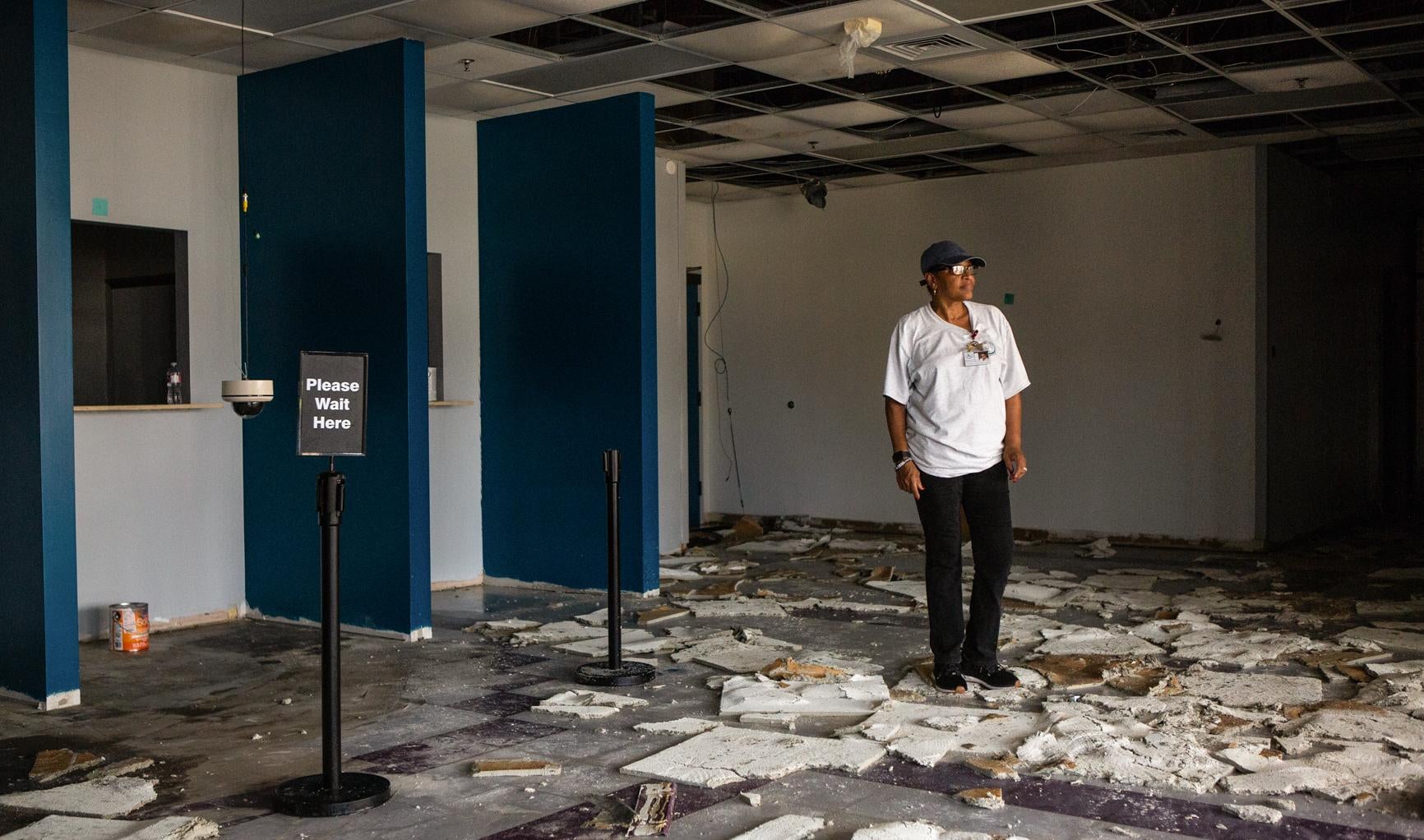Speaking of Climate Change


Climate change is the greatest public health crisis we face, with global implications for tackling disease, food, safety, and security. When it comes to cultivating consensus and adoption of the best solutions, communication is key—and the messenger matters most.Have you ever heard the phrase “Your vibe attracts your tribe”? We often surround ourselves with people of similar beliefs, whether intentionally or not. Wilbur Schramm, one of the original academics in communication theory, suggested that individuals are more likely to receive information if they share the same field of experience, beliefs, values, and learned meanings as the sender of information. The implication is that fruitful conversations on climate change are more likely to result from conversations between members of the same “tribe”—individuals with similar beliefs, shared experiences, or kindred values.
C-Change Conversations, which was launched by an all-volunteer group in 2014 (and is unrelated to the Harvard Chan School’s center with a similar acronym), embodies these principles. Their mission is to discuss climate change with moderate and conservative audiences by meeting them where they are. It’s an approach that is yielding results across the country, and I hope you can learn from their experiences and adapt them to your personal and professional work.
—Gina McCarthy
Professor of the Practice of Public Health; Director of the Center for Climate, Health, and the Global Environment (C-CHANGE); Harvard T.H. Chan School of Public Health
By Kathleen Biggins and Katy Kinsolving
The tall gray-haired man spoke politely but firmly, his frustration obvious. “I don’t buy into the fact that man is causing climate change, and I certainly reject big-government policies that pick winners and losers in the energy markets.” Next to him, a younger man chimed in, “Even if it’s real, we can’t hurt our economy with more regulations when China and India are getting a free ride.” The young man’s wife added, “I’m in finance, and I know you can’t trust models, especially ones that project far in the future. Why should I trust climate models?”
The tension in the audience was palpable. How would the speaker, who was there to outline the risks of climate change, respond to these challenges?
This scenario plays out often as our group, C-Change Conversations, travels the country speaking to moderates and conservatives about the risks of climate change. On this night, we were addressing a group at a private club, but it could just as easily have been in a church basement, a theater, the community room of a public library, or even in a private home. Often, the audience is guarded; people may feel personally attacked when someone says climate change is real. Our objective is to neutralize that emotional response and help audience members evaluate climate change risk in a different way.
Tribal Communication
Social psychologists such as Jonathan Haidt have documented that much of our decision making takes place based on instinct, influenced by those we consider to be members of our “tribe,” and that our intellect is used to confirm that choice. This means that on an issue such as climate change, facts alone are not persuasive. The top predictor of one’s opinion on climate change is political party affiliation: Individual positions on the issue are often a litmus test of whether someone is a “good conservative” or a “good liberal.”
Our organization, C-Change Conversations, has been able to work with the seemingly inflexible target of political moderates and conservatives to discuss how they evaluate climate-change-related risk. We reach people with climate change information through their nonpolitical “tribes”—associations like garden clubs, business clubs, investment clubs, and country clubs. By meeting with those who are skeptical, in a place where they are comfortable and surrounded by people they consider to be peers and friends, we find they are more willing to listen. We often speak at regularly scheduled meetings, so that audience members do not have to consciously decide to come hear our message. This means they don’t feel disloyal to their tribe, uncomfortable, or that they are wasting their time.
We try to establish a personal connection with each group’s leadership. Our team members are usually similar to our audiences—perhaps they have lived or attended schools in their area, had similar career paths, or have been members of a similar association. We are introduced by someone within the audience’s group who has heard us before. This gives us an endorsement from a member of the “tribe,” someone whom our audiences know and trust. When people learn that we do not have a political agenda and that we are volunteers traveling the country solely because we are concerned and want to share this message, they are even more receptive to listening.
Leveraging Conservative Values
Our presentation begins with three facts everyone can agree on: that the climate has always been changing due to natural causes, that fossil fuels have helped us create vibrant economies and have improved our quality of life, and that climate change is a difficult question to discuss. We do not frame climate change as an environmental issue. Instead, we talk about how it will negatively impact our economy and jobs, our personal security and health, and our exposure to geopolitical instability. We use humor and a friendly, nonlecturing tone, and we provide scientific information from credible sources such as the National Aeronautics and Space Administration (NASA) and the National Oceanic and Atmospheric Administration.
 We give audience members the opportunity to see climate change in action by showing images of glaciers and the Arctic Ocean’s mature ice layer melting, sunny-day nuisance flooding in shoreline communities, and NASA’s graphic of the earth heating up as average decadal temperatures have risen. We tailor some information to each market, underscoring that climate change is already impacting them personally. For example, we outline how active-mosquito days have increased in their own town, increasing residents’ risks of vectorborne disease.
We give audience members the opportunity to see climate change in action by showing images of glaciers and the Arctic Ocean’s mature ice layer melting, sunny-day nuisance flooding in shoreline communities, and NASA’s graphic of the earth heating up as average decadal temperatures have risen. We tailor some information to each market, underscoring that climate change is already impacting them personally. For example, we outline how active-mosquito days have increased in their own town, increasing residents’ risks of vectorborne disease.
While our presentation is grounded in science, we translate it into layman’s terms. For example, we explain that fossil fuels are made from carbon that fell to the surface of the earth millions of years ago, got sequestered over the ensuing period, and that humankind’s actions are reintroducing that carbon into the atmosphere at a rate that does not happen in nature.
We also note that many politically and culturally conservative institutions, such as the military, national intelligence agencies, and large corporations, are identifying the risks associated with climate change. We add that a moderate and conservative stance is not necessarily at odds with government action on climate change. Indeed, several lions of the Republican Party—including former Secretary of State George Shultz, and former Secretaries of the Treasury James Baker III and Henry M. Paulson—have been outspoken proponents of policies such as placing a fee on carbon, arguing that such policies follow conservative free-market principles. Recently, Lamar Alexander, the Republican senior senator from Tennessee, proposed a new “Manhattan Project” that focuses on investing in research to create advanced computing and breakthroughs in nuclear, natural gas, carbon capture, better batteries, greener buildings, electric vehicles, and solar power.
Most important, we are scrupulously nonpartisan. We highlight the fact that economic and political realities have historically precluded both major parties from taking steps to mitigate climate change risks, and that many different effective policy approaches, including those that fit within a conservative agenda, could be implemented today.
Inspired by Personal Change
Our approach is grounded in our own personal experience. We are moderates and conservatives ourselves, and our minds were opened when we attended a national affairs and legislation conference on conservation in 2013 organized by the Garden Club of America. We heard business leaders, scientists, and a rear admiral of the United States Navy describe how climate change was a significant and urgent threat to all Americans because of its impact on our economy, health, and national security. We listened in part because they were such credible experts and were presented by an organization that we trusted and respected.
Our founder, Kathleen Biggins, spent the next year educating herself on the issue. She recognized that many of her conservative and moderate peers did not believe the risk was real or significant. She wondered if it was possible to mirror the experience that had changed her own mind at the conference and decided to create a salon-style lecture series of experts that would be credible to those two groups. She felt that hosting the events in private homes would help attendees feel welcome and comfortable.
Kathleen asked three others who had attended the national gardening conference to join her. Those three were Pam Mount, the former mayor of Lawrence, New Jersey, who has deep experience in public-private partnerships; Katy Kinsolving, a former nonprofit management consultant with public relations experience; and Carrie Dyckman, a former producer of educational and electronic media. Together, we launched C-Change Conversations in 2014 in our home community of Princeton, New Jersey.
Since then, C-Change Conversations has hosted 17 lectures, featuring scientists such as Arctic specialist Max Holmes of the Woods Hole Research Center; financiers such as Bob Litterman, former manager of risk at Goldman Sachs; public policy experts including Christine Todd Whitman, former Republican governor of New Jersey and former Environmental Protection Agency administrator; David Crane, former chief executive officer of NRG Energy; and Peter Hoeppe, former head of Geo Risk Research at the Global Climate Forum and a climate expert for the world’s leading reinsurance company, Munich Re.
A Primer on Climate Change
The speaker series raised climate change awareness among business and community leaders in Princeton. It also positioned C-Change Conversations as a credible voice in climate change communication. However, we realized that many in the audience lacked an understanding of the science underpinning climate change and therefore did not recognize the urgency of the issue. We could tell from their questions and comments that they viewed the issue as an intellectual one, rather than one that would directly impact their own well-being. Without an accessible overview of the science and economics, it was difficult for them to appreciate the scope, complexity, and short-term implications of the problem.
For instance, many did not understand that greenhouse gases make up a tiny portion—less than 1 percent—of our atmosphere, yet play an outsized role in stabilizing the temperature that has enabled humans to thrive over the last 10,000 years. It was hard for them to appreciate how human activities that release additional greenhouse gases into the atmosphere could have such a profound effect on temperature, precipitation, and agriculture. In addition, we provided historical perspectives to help our listeners understand why the current speed of change in weather trends, which is unprecedented in past cycles of nature, exacerbates the dangers of a warmer planet.
Our team held focus groups with their peers to understand what information they would find helpful. Kathleen, who has a background in journalism and advertising, worked with climate scientists and energy policy experts to develop the C-Change Conversations “Primer,” a 50-minute presentation designed to answer questions that moderates and conservatives—who are often concerned that the risks are hyped and that any action to combat climate change will harm our economy—might have on the issue.
After presenting the Primer locally, C-Change Conversations was asked to open the Garden Club of America’s same national conservation conference that had started them on their journey. From there, delegates who heard the presentation invited them to their communities around the country. Two years after the group’s formation, C-Change Conversations has been asked to present to a wide range of organizations in 26 states, including Florida, Kentucky, Louisiana, Mississippi, South Carolina, Tennessee, and Texas.
Fighting the “Spiral of Silence”
Our goal is to reach as many people as we can with the overarching message that climate change is a critical issue in species survival, environmental conservation, global migration, and human well-being in general—and one that we need to join together to address. Social scientists say there is a “spiral of silence” around this issue, that most Americans do not discuss it on a regular basis. This silence enables policymakers—who are elected to fix issues of immediate concern, not become embroiled in complex and difficult long-term problems—to leave climate change action for others.
 A recent national survey found that climate change ranks 17th in importance among issues that Americans consider when they go to vote. We want our fellow citizens to consider how climate change will affect corporate profits, jobs, competitive advantage, national security, public health, and the environment. We want our audience members, no matter where they fall along the political spectrum, to understand how and why that is true, so that they can demand action from politicians, policymakers, and business leaders.
A recent national survey found that climate change ranks 17th in importance among issues that Americans consider when they go to vote. We want our fellow citizens to consider how climate change will affect corporate profits, jobs, competitive advantage, national security, public health, and the environment. We want our audience members, no matter where they fall along the political spectrum, to understand how and why that is true, so that they can demand action from politicians, policymakers, and business leaders.
The public health arena is an important forum for us. We have learned from past presentations to health care professionals that many do not understand how climate change will impact them personally, nor how it could affect their patients. Many have not focused on how the trend undermines health in general—for example, how climate change leads to heavier precipitation, which compromises water supply and can isolate or close hospitals and medical facilities. Climate change also raises the risk and severity of natural disasters. Dangerous heat waves increase mortality and put pressure on agriculture, diminishing the quantity and quality of our food supply.
Opening Ears, Hearts, and Minds
We continue this effort because we see and hear that we are making a difference. At almost every presentation we deliver, we are asked to go to another community to deliver the Primer. This strong word-of-mouth reception suggests to us that our approach is working. Again and again, audience members have thanked us for our apolitical, calm, moderate tone. This type of reception underscores that people are willing to change their minds if approached in a respectful, nonpartisan way.
Recently, we received a standing ovation from a conservative crowd in Columbia, South Carolina. In Nantucket, Massachusetts, we were approached by an attendee who said, “You’ve opened my ears, my heart, and my mind.”
Survey results and testimonials from attendees show that many of them now feel more comfortable talking about climate change because it seems “less taboo.” They say they feel “empowered” because they understand the basic science of why climate change is unfolding. We believe there are many ways for an individual to help address climate change, and we offer a few suggestions to audiences at the end of the presentation—from managing their personal carbon footprint to supporting organizations that are working in this arena. Because we are a 501(c)(3) organization, we do not engage in lobbying efforts. We do encourage everyone who comes to our presentations to vote—no matter on which side of the aisle they sit—and we encourage them to contact their legislators at the local, state, and federal level to let them know that addressing climate change is important.
The scale of the response necessary to blunt the worst of climate change mandates that we as a society come together, just as we did in the race to the moon and our victory in World War II. But we cannot join forces without consensus that the problem is real and urgent. In our focused efforts with moderates and conservatives, we are trying to do our part in laying the groundwork for action.
As an audience member in Louisiana wrote to us: “Thank you for presenting the facts that get to the core of the matter. I for one will not sit around waiting for the ice caps to melt … you have inspired me to take action and sound the alarm in the name of all mankind.”
Kathleen Biggins and Katy Kinsolving are the co-founders of C-Change Conversations.


